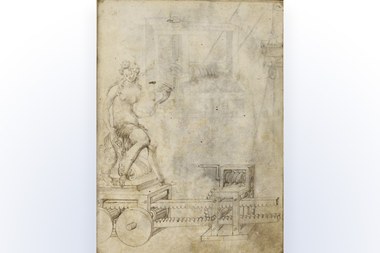An Architecture of Machines: Francesco di Giorgio’s Opusculum de architectura
Francesco di Giorgio’s autograph manuscript of machine design, the Opusculum de architectura (c. 1475; The British Museum, ms. 197.b.21) is one of the most exceptional records of early modern architecture. Prefaced with an eloquent Latin dedication to Duke Federico da Montefeltro, the vellum manuscript reads as a celebration of the art and ingenuity of technical design. Comprised of approximately eighty-five folios, the manuscript illustrates designs for hoists and scaffolding, machines of war and mobile defences, pumps, siphons, mills and cars. Yet, this is by no means a typical presentation volume. The spectacular machines are almost all rendered without indication of scale, use, context or material. They assume meaning in the fecundity of ideas they collectively present, yet as consciously assembled within the manuscript, they lack the explicitly didactic aims of Francesco di Giorgio’s own Trattato di architettura or other contemporary treatises. It is all the more astonishing then that in the sixteenth century, the drawings of the Opusculum came to assume the status of canonical graphic models. As underscored in the foundational study of Carlo Promis, Francesco’s machine designs were “found in all books of mechanics of the sixteenth century,” and were so ubiquitous that he deemed them “of little importance.” For Promis, as for generations of architectural historians to follow, early modern machine design did not belong to architecture proper; these were the mundane, diagrammatic models of the lowly practitioner.
The Opusculum—as both a unique material document and as a phenomenon of early modern architecture—is a true palimpsest. It introduces not a single narrative, but a web of intersecting stories, involving a cast of characters that extends from the architect-in-training to the noble military captain.
This research project, which will culminate in a critical edition of the Opusculum, explores the origins, life and legacy of the enigmatic manuscript. The study considers approximately thirty manuscripts that may be demonstrably tied to Francesco di Giorgio’s autograph Opusculum—in common patrimony, as direct copies, or as descendants. Through this analysis, we are not only to better understand the practical and didactic value of the Opusculum’s drawings, but can also spotlight the ubiquity of copying among early modern architects, and literally retrace the techniques of semi-mechanical copying they commonly employed.
Project Info
Research group: Theory and History of Architecture
Start Date: 15/11/2022
Researchers: Elizabeth Merrill and Anna Rebecca Sartore
